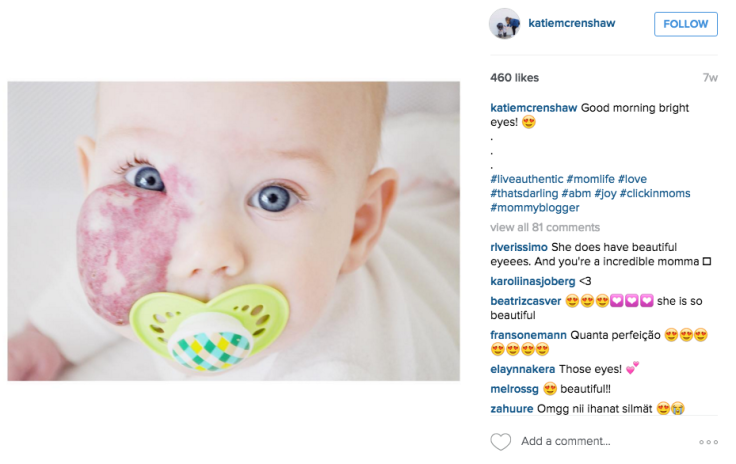Mother Of Baby With Large Birthmark On Face Wants People To Stop Staring; What Is A Capillary Hemangioma?

Charlie Crenshaw is a happy 6-month-old baby and an Instagram darling, but the right side of her face is covered by a large tumor birthmark, a genetic abnormality that often draws stares and concerned comments from passersby.
Charlie’s mother, Katie Crenshaw, hopes to dispel the pitying looks and hurtful comments aimed at her daughter by speaking out about Charlie's skin condition. In a blog post titled “What’s Wrong With Her Face?” Crenshaw tackles the issue at hand, noting that people are unable to accept a feature of her child that makes her different. “It is usually the first thing people notice about her,” Crenshaw wrote. “I know, because it’s usually the first thing that people comment on.”
Charlie’s birthmark is called a capillary hemangioma — a benign tumor on the skin that's caused by the abnormal growth of blood vessels. Because of its red, lumpy look, a capillary hemangioma is often sometimes called a “strawberry” birthmark. While these hemangiomas aren’t harmful, they may pose a problem if they obstruct an airway or eyelid. But Charlie’s is located on her right cheek and it doesn’t cause her any problems. It will likely go away by the time she’s 10 years old, as most capillary hemangiomas occur in infants by the time they’re 6 months old, and disappear on their own a few years later. “She isn’t in pain or ill,” Crenshaw continued in the blog post. “She simply has an unusual quality about her appearance.”
A capillary hemangioma can occur when there's a buildup of small blood vessels either on or under the skin, and it can protrude from the face, neck, or any other part of the body. There are various types of these benign tumors, with some growing right on the surface of the skin and others in the deeper layers. While there is no exact cause behind hemangiomas, they appear to be genetic and to run in families. In addition, they’re more likely to occur in girls, low-weight infants, or premature babies. Charlie takes Propranolol, a beta-blocker medicine that prevents hemangiomas from growing further and helps them fade, but otherwise has no complications from the condition.
Crenshaw noted that she grew tired of hearing pitying comments like “I’m praying that it goes away” or “Bless her poor little heart.” The focus on her daughter shouldn’t be on the birthmark that makes her different; rather, Crenshaw argues, it should be about her smile or beautiful eyes.
I encourage you to, instead of praying it will disappear, pray that she grows into a confident girl who loves herself no matter what she looks like. Pray that constant comments and opinions from friends, family and strangers will end before she’s old enough to overhear them. Pray that she will be a strong person in an age where we are bullied for any number of reasons.
Crenshaw hopes her words will not only protect children with hemangiomas from stares and bullying, but that they'll also mean something to the countless people who have some unique physical abnormality that makes them stand out.



























